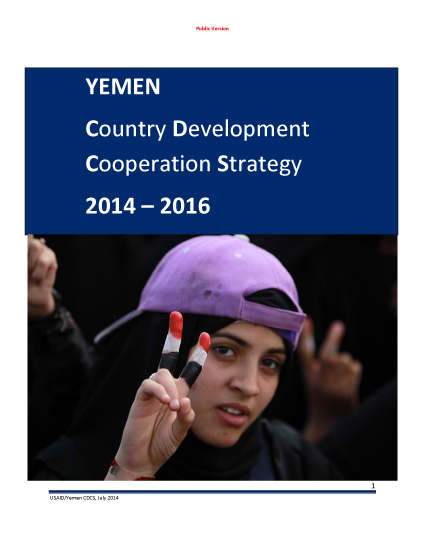Speeches Shim
Yemen is a country in transition. Characterized as a fragile state, it is conflict-afflicted, impoverished, and in a critical post-revolutionary stage.
Almost half of the country’s population of 25 million lives without access to safe water and sanitation, and over ten million suffer chronic hunger. High unemployment and poverty contribute to political tensions that are compounded by conflict with separate secessionist movements in the north and south, and disruptive extremist operations of Al Qaeda in the Arabian Peninsula (AQAP).
Yemen is strategically important for stability in the region as well as for security of key oil and commercial maritime routes. United States Government (USG) priorities for Yemen are to combat AQAP, marshal support for global efforts to stabilize Yemen, and direct developmental and humanitarian assistance to underpin sustainable and inclusive economic development, improved governance, and social protection. The Country Development Cooperation Strategy (CDCS) for Yemen delineates USAID objectives and defines priorities for developmental and humanitarian assistance over the planning period of fiscal years 2014 through 2016.
As of January 2015, USAID Yemen continues to implement the July 2014 CDCS despite the operational challenges posed by countrywide instability associated with the Houthi movement. Although progress is hindered and slowed, partners continue to provide critical humanitarian assistance to address urgent needs and support Yemen's transition with an array of critical development programs.
Strategic Focus: This three-year strategy directs efforts in ways that leverage a historic opportunity for political transition, and it aligns and integrates technical areas of development assistance with current humanitarian aid programs. This strategy will capitalize upon positive momentum in the country, mitigate the challenges of vested interests and humanitarian crises, and stay flexible in the fluid context of transition. The focus will be on addressing the core barriers to participation that inhibit development and resilience. The immediate emphasis is delivery of humanitarian assistance and support for an informed, inclusive and participatory approach to political transition. Going forward, the programmatic thrust increasingly addresses development challenges at the local level, including matters of governance, civic participation, public service delivery, economic growth, and private sector job creation.
USAID/Yemen’s overarching goal for the strategy period is Strengthening Yemen’s progress to a Prosperous and Resilient Country. The goal will be achieved through three Development Objectives (DOs):
- DO 1: Effective and Representative Democracy Advanced.
- DO 2: Social Development Improved.
- DO 3: Sustainable Economic Opportunities Increased.
The expectation is that a successful political transition will result in devolution of governing power to the local level and better establish conditions in which development and more inclusive growth can occur. USAID’s aim is to facilitate the transition and assist in the improvement of individual and community well-being. The strategy will advance this aim by helping to build the asset base of households to reduce vulnerabilities and facilitating and developing systems for local governance and cooperative public and private community action in the areas of economic growth and development, natural resource management, disaster risk reduction, conflict mitigation, public safety, and construction and maintenance of public infrastructure, including water and sanitation systems, health clinics and schools.
USAID supports participation and inclusion to empower reformers, as well as institutional strengthening for more inclusive and accountable methods of political and economic governance. USAID promotes job creation and supports improved food and water security, health care delivery, family planning, and primary education outcomes. USAID supports increased access to improved water supply and sanitation services and increased prevalence of key hygiene behaviors to prevent disease and improve health outcomes. Economic opportunities are enhanced through a value chain approach, targeting job creation in high value agricultural production, processing, marketing and support services. Improved efficiency and sustainability of rain-fed and irrigated agricultural systems is promoted to improve water productivity and stretch the limited water supply.
USAID projects aim to reduce gender disparities in access to, control over, and benefits received from resources, wealth, opportunities and services. Activities serve to reduce gender-based violence and mitigate its harmful effects on individuals and communities. USAID will increase the capacity of women and girls to realize their rights, determine their life outcomes, and influence decision-making in households, communities, and societies. USAID promotes inclusion across the scope of the program so as to draw on the potential and talent of the entire population, to encourage innovation for new wealth creation, and to improve prospects for more effective, comprehensive, and sustainable development results.



Comment
Make a general inquiry or suggest an improvement.